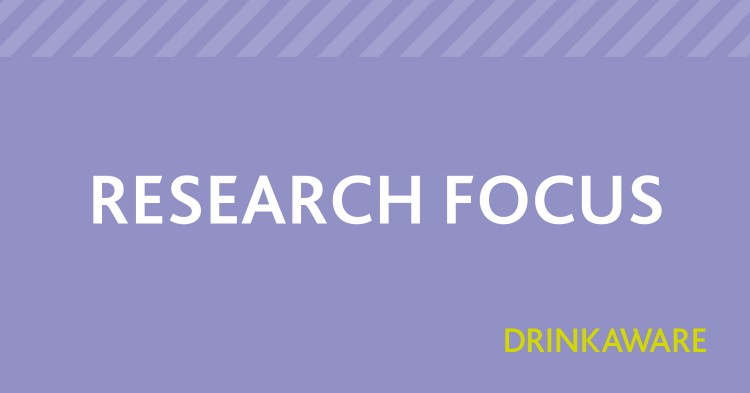We created the Drinkaware Research Breakfast Briefing series to reach out to all stakeholders to build a community of active and interested researchers in the health and behaviour change space. We encourage collaboration both with us and each other through creating an opportunity where we can collectively discuss issues relating to alcohol in Ireland and in so doing, contribute to sharing learnings and knowledge. Please email Dr Ann Stokes, Research & Impacts Manager, to be added to our mailing list for future events.
At our Spring 2020 briefing, we were delighted to have Dr Ollie Bartlett, Assistant Professor at the Department of Law, Maynooth University present a paper on the role of law as part of a comprehensive alcohol strategy.
Dr Bartlett carefully took us through the relevant provisions of European Union free movement law, World Trade Organization law, and EU fundamental rights law. He also provided several case studies to demonstrate how regulatory practices have either been implemented or are being proposed in different countries – including minimum unit pricing (MUP) in Scotland, cancer warning labels in Ireland, advertising restrictions in Estonia and public drinking restrictions in Spain (Majorca/Ibiza). Thre key takeaways from the briefing are below.
- Lack of awareness of the international and regional legal frameworks that govern alcohol control measures
- Legal interventions that re-shape the decision-making environment to facilitate healthier choices are a vital part of comprehensive alcohol control strategy, alongside the provision of educational opportunities tailored to individual need to change people’s behaviour and attitudes.
- A multi-sector approach to alcohol control is required, which accounts for national and local context, and strategically measures impact.
The presentation was followed by a discussion among the 20 attendees that raised a number of issues. For instance, there was some consensus that whilst regulation is an important and necessary element to alcohol control, law on its own cannot change peoples’ behaviour and attitudes. All approaches recommended by the WHO Global Alcohol Strategy should be employed, without over-reliance on any individual measure.
Drinkaware believes that the provision of educational opportunities tailored to individual need are crucial. The provision of evidence-based education and information awareness are vital in order to allow people to build up an understanding of what alcohol misuse is (i.e. HSE low-risk weekly alcohol guidelines and standard drinks) and the dangers associated with excessive consumption.
The specific context in which regulation takes place was another point raised in the discussion. If a regulatory tool (such as minimum unit pricing) is employed successfully in one jurisdiction, this does not mean it will automatically achieve the same outcomes in another jurisdiction. Both environmental and cultural factors must be taken into consideration when designing alcohol legislation. For instance, Drinkaware notes that while recorded consumption among Irish adults is currently showing a slight decrease, unrecorded consumption levels are slowly rising. In Ireland, recorded consumption of alcohol per capita was 11.5 litres in 2010 vs 11.3 litres in 2016, while the equivalent figure in terms of unrecorded consumption was 0.5 litres in 2010 vs 1.4 litres in 2016 (WHO Global Health Observatory, 2020).
The importance of examining the impact of regulatory measures through the lens of longer-term evaluation was noted during the post-presentation discussion. Alcohol strategies must make lasting changes to socio-economic structures to facilitate healthier choices, as well as helping people to change their behaviour and attitudes. Herein lies the importance of stories. Drinkaware is seeing a small appetite for change in Ireland. For instance, through our annual Barometer survey in 2019, we identified that 44% of Irish adults have made small positive changes to their drinking habits (i.e. to drink less). In addition, 68% have become much more aware of how excessive drinking affects health and wellbeing. Notably this was found to be greatest among u34s, with 54% u34s having made small positive changes. 30% of Irish adults highlighted that they would like to drink alcohol less often – with physical health, physical fitness and finances cited as the strongest influences. These changes are also reflected in the opening of Ireland’s first no-alcohol pub ‘The Virgin Mary’ last year.
The presentation title suggests, and the reaction of those in the room supported, that regulation is a vitally important element of alcohol control as part of a wide range of alcohol policies. As concluded by Dr Bartlett, a multi-faceted approach that takes account of national context and strategically measures impact is required to reduce alcohol misuse and related harm, one that will create health promoting environments and facilitate and promote socially responsible behaviour.
We look forward to facilitating further debate on alcohol and behavioural change by facilitating our next Research Breakfast Briefing on Wednesday, 13th May 2020. If you would like to be added to our invite list, please email research@drinkaware.ie.


